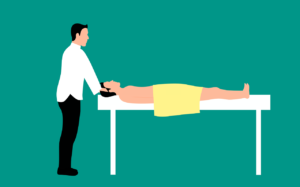
Imagine waking up in the morning feeling stiff and sore, unable to move your neck without wincing in pain. You might think it’s a result of sleeping in an awkward position, but have you ever considered that the culprit might actually be your pillow? That’s right, the wrong pillow can contribute to neck pain, causing discomfort and disrupting your sleep. In this article, we will explore how choosing the wrong pillow can lead to neck pain and provide some tips on finding the perfect pillow to ensure a good night’s sleep and a pain-free morning.

Common Causes of Neck Pain
Neck pain is a common ailment that many people experience at some point in their lives. While it can be caused by a variety of factors, one common culprit is the use of the wrong pillow. The wrong pillow can lead to poor neck and spine alignment, muscle strain and tension, and restricted blood flow. Understanding the common causes of neck pain can help you make informed decisions when it comes to choosing the right pillow for a good night’s sleep.
Poor Pillow Support
One of the main causes of neck pain is poor pillow support. When your pillow doesn’t provide adequate support for your neck and head, it can result in misalignment of the spine. This misalignment puts stress on the muscles and ligaments in your neck, leading to discomfort and pain.
Incorrect Pillow Height
Another factor that can contribute to neck pain is using a pillow with incorrect height. The height of your pillow should be determined by your sleeping position, as it affects the alignment of your neck and spine. If your pillow is too high or too low, it can cause strain on the muscles and ligaments in your neck, leading to stiffness and pain.
Inadequate Pillow Firmness
The firmness of your pillow also plays a crucial role in preventing neck pain. If your pillow is too soft, your head may sink too far into the pillow, resulting in poor neck and spine alignment. On the other hand, if your pillow is too firm, it can put excessive pressure on your neck, leading to muscle strain and discomfort.
Impact of the Wrong Pillow
Using the wrong pillow can have a significant impact on your neck health and overall comfort. It can lead to various issues, including misalignment of the spine, muscle strain and tension, and restricted blood flow.
Misalignment of the Spine
When you sleep with the wrong pillow, it can cause a misalignment of your spine. This misalignment puts strain on the muscles, ligaments, and discs in your neck and upper back, leading to stiffness and pain. Over time, this can result in chronic neck issues and even contribute to other spine-related problems.
Muscle Strain and Tension
An unsupportive or incorrect pillow can also lead to muscle strain and tension in the neck and shoulder area. When your pillow fails to provide adequate support, your neck muscles have to work harder to maintain proper alignment. This can result in muscle fatigue, knots, and spasms, causing discomfort and limiting your range of motion.
Restricted Blood Flow
Using the wrong pillow can even restrict blood flow to your neck and head. When your pillow doesn’t support your neck properly, it can compress the blood vessels in the area. This can lead to reduced circulation, causing pain, numbness, and even headaches.

Choosing the Right Pillow
To prevent neck pain, it’s important to choose the right pillow that suits your individual needs. Here are some factors to consider when selecting a pillow:
Consider Your Sleeping Position
Your sleeping position plays a crucial role in determining the type of pillow you need. Different sleeping positions require different levels of support to maintain proper alignment. For example, if you sleep on your back, a pillow with medium support and proper height is usually recommended. On the other hand, if you sleep on your side, a slightly firmer pillow with higher loft is preferred to keep your neck and spine aligned.
Determine the Proper Pillow Height
The height of your pillow should be determined by the natural curve of your neck and the alignment of your spine. Ideally, your pillow should fill the gap between your head and shoulders, keeping your neck in a neutral position. If your pillow is too high or too low, it can strain the muscles and cause discomfort. Experiment with different pillow heights to find the one that provides optimal support for your neck and spine.
Select the Appropriate Firmness Level
The firmness level of your pillow is another essential factor to consider. The right firmness level depends on personal preference and the level of support you need. A pillow that is too soft may not provide enough support, while one that is too firm can put excessive pressure on your neck and shoulders. Choose a pillow with a firmness level that allows your head to sink slightly into the pillow while still maintaining proper alignment.
Pay Attention to Pillow Materials
The materials used in your pillow can also affect your comfort and support. Memory foam pillows are popular for their ability to contour to the shape of your head and neck, providing personalized support. Latex pillows are another good option as they are more responsive and durable. Different materials offer varying levels of firmness and support, so consider your preferences and any allergies you may have when selecting a pillow.
Types of Pillows to Avoid
While choosing the right pillow is essential, it’s also important to avoid certain types of pillows that can exacerbate neck pain and discomfort.
Unsupportive Feather Pillows
Feather pillows may feel luxurious, but they often lack the necessary support to keep your neck properly aligned. These pillows tend to flatten quickly and fail to provide the required cushioning for your head and neck. As a result, they can contribute to neck pain and stiffness.
Overly Firm or Thick Pillows
Pillows that are overly firm or thick can put excessive strain on your neck and shoulders. While some people may prefer a firmer pillow, too much firmness can cause discomfort and restrict proper alignment. Similarly, pillows that are too thick can tilt your head forward, straining the muscles and causing pain.
Non-Adjustable Pillows
Non-adjustable pillows, such as those made with traditional foam or down, may not provide the flexibility needed to cater to different sleep positions and personal preferences. These pillows often lack proper support and fail to maintain their shape over time, leading to discomfort and inadequate neck support.

How to Identify Neck Pain Caused by the Wrong Pillow
It’s important to be able to identify neck pain caused by the wrong pillow to take the necessary steps for relief and prevention. Here are some signs that your neck pain may be the result of using the wrong pillow:
Persistent Discomfort upon Waking Up
If you consistently wake up with neck pain or stiffness, it may be a sign that your pillow is not providing adequate support. The wrong pillow can lead to muscle strain and fatigue overnight, resulting in discomfort upon waking up. Pay attention to how your neck feels in the mornings to determine if your pillow is the culprit.
Headaches and Migraines
Using the wrong pillow can also contribute to headaches and migraines. When your neck is not properly supported during sleep, it can lead to tension in the muscles and strain on the nerves. This tension and nerve compression can result in headaches that persist throughout the day.
Shoulder and Arm Pain
Neck pain caused by the wrong pillow can also radiate to the shoulders and arms. Improper alignment of the neck and spine can cause muscle tension and nerve irritation that extends to these areas. If you experience shoulder or arm pain in addition to neck discomfort, it may be a sign that your pillow needs to be replaced.
Preventing Neck Pain with the Right Pillow
Prevention is key when it comes to neck pain caused by the wrong pillow. By choosing the right pillow and maintaining proper sleeping posture, you can significantly reduce the risk of experiencing neck pain. Here are some strategies to prevent neck pain:
Maintain Proper Sleeping Posture
Proper sleeping posture is crucial for preventing neck pain. Regardless of your sleeping position, it’s important to keep your neck and spine aligned. Avoid sleeping on your stomach, as it can strain your neck and lead to discomfort. Instead, opt for sleeping on your back or side, using pillows that provide support and maintain proper alignment.
Invest in a Supportive Pillow
Investing in a supportive pillow can make a world of difference in preventing neck pain. Look for pillows specifically designed to promote proper neck and spine alignment. Options such as contoured pillows or cervical pillows are often recommended for their ability to support the natural curvature of the neck and provide optimal comfort.
Ensure Proper Pillow Maintenance
Regularly maintaining and cleaning your pillow is important for both hygiene and longevity. Follow the manufacturer’s guidelines for cleaning or laundering your pillow, as different materials may require specific care. Additionally, consider replacing your pillow every 1 to 2 years or when you notice any signs of deterioration, such as loss of firmness or lumps.
Additional Tips to Alleviate Neck Pain
While using the right pillow is essential for preventing neck pain, there are additional measures you can take to alleviate any existing discomfort. Here are some tips to help alleviate neck pain:
Practice Neck Stretches and Exercises
Engaging in neck stretches and exercises can help relieve tension and improve flexibility in the neck muscles. Gentle stretches, such as tilting your head from side to side or rolling your shoulders, can provide relief and promote better posture. Consult with a healthcare professional or physical therapist to learn proper techniques and exercises that are suitable for your individual needs.
Use Heat or Cold Therapy
Heat and cold therapy can be used to reduce inflammation and relieve soreness in the neck. Applying a warm towel or using a heating pad can help relax muscles and increase blood flow. Alternatively, using a cold pack or ice wrapped in a cloth can numb the area, reducing pain and swelling. Experiment with both heat and cold therapy to see which provides the most relief for your neck pain.
Avoid Sleeping on Your Stomach
Sleeping on your stomach is known to contribute to neck pain and discomfort. This position places excessive strain on your neck and can lead to misalignment of the spine. Try to avoid sleeping on your stomach and instead opt for sleeping on your back or side with the proper pillow support.
The Importance of a Good Night’s Sleep
A good night’s sleep is essential for overall well-being. Quality sleep is associated with improved mood, increased productivity, and better physical health. Using the right pillow to provide proper neck support can significantly enhance the quality of your sleep. By preventing neck pain and discomfort, you can ensure a restful night’s sleep and wake up feeling refreshed and rejuvenated.
Quality of Sleep Affects Overall Well-being
The quality of your sleep has a direct impact on your overall well-being. When you don’t get enough restful sleep due to neck pain or discomfort, it can affect your mood, cognitive function, and overall energy levels. Chronic sleep deprivation can lead to a variety of health issues, including increased stress, decreased immune function, and even an increased risk of developing chronic conditions such as heart disease or diabetes.
Benefits of Using the Right Pillow for Neck Support
Using the right pillow for neck support has numerous benefits for your sleep quality and overall health. By providing proper alignment and support for your neck and spine, the right pillow helps reduce the risk of developing neck pain and discomfort. It allows your muscles to relax and promotes healthy blood circulation, enabling your body to recover and rejuvenate during sleep. With enhanced comfort and support, you can enjoy a deeper, more restorative sleep, leading to improved daytime functioning and overall well-being.
Consulting a Healthcare Professional
While choosing the right pillow and practicing good sleep habits can go a long way in preventing and alleviating neck pain, there may be instances where consulting a healthcare professional is necessary.
When and Why to Seek Medical Advice
If you experience chronic or severe neck pain that persists despite making adjustments to your sleeping habits and pillow, it’s important to seek medical advice. A healthcare professional, such as a doctor, physical therapist, or chiropractor, can assess your condition and provide appropriate guidance and treatment options. They may recommend further diagnostic tests, prescribe medications, or provide specialized therapies to address your neck pain effectively.
In conclusion, the wrong pillow can be a significant contributor to neck pain. By understanding the common causes of neck pain and the impact of using the wrong pillow, you can make informed decisions when selecting the right pillow for your needs. Remember to consider your sleeping position, pillow height, firmness level, and materials to ensure optimal support and alignment. By preventing and alleviating neck pain with the right pillow and adopting good sleep habits, you can enjoy a restful night’s sleep and wake up feeling refreshed and pain-free.







